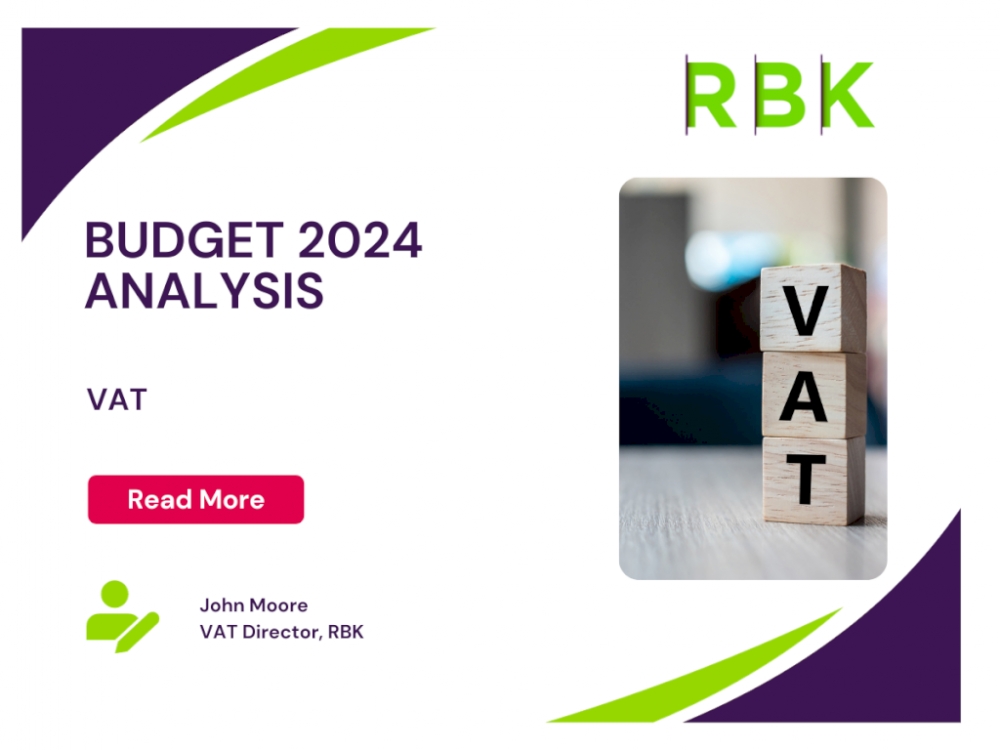Whether business or personal, we all have a number of priority issues we’d hope or strongly argue are addressed in October’s budget announcement. Some issues are social, some are economic, but all based on hard (or digital) cash left over (assuming there is some) after commitments, outgoings and taxes, have been paid. It falls to the Minister for Finance to manage these calls taking account of positive exchequer funds balanced against potentially competing requirements to manage inflation, address a cost of living crisis, working to ease the housing shortage, trying to make inroads on climate concerns, while remaining pro-business. And this as part of a global economy. At a local level, a positive action on one point cannot be completely negated by an adverse impact on another. Quite the annual balancing act.
So what has this to do with VAT?
For 2022, VAT represented nearly a quarter of net exchequer tax receipts.
VAT is a tax on spending, with the consumer ultimately bearing the cost. VAT will be “cost neutral” for many operators, assuming they can pass on any VAT they have to levy. But for those businesses for whom VAT is a cost, they are in effect, just like consumers and have to pay and fund as an expense, any VAT they cannot recover. For businesses and consumers who cannot recover VAT, having to pay less of anything, including VAT, is positive. It leaves more funds for other things, discretionary or otherwise. That’s positive in actual money terms, but not so good where the value of that money is reduced due to an increase in inflation and the related cost of living impact.
Acknowledging the risk of inflation, the understood preference of most businesses and consumers is to have more disposable income to save or spend as they choose. In the case of spending, a reduction in any VAT rate would be an immediate positive. Under EU rules, the Minister has relatively limited scope to change VAT rates applying to different items.
While there would be scope to vary the standard rate of VAT (currently 23%), this is an action not expected to be taken given the resultant exchequer cost of approx. €580m [1] per 1% change in rate (based on 2022 statistics).
At most, there may be “targeted” changes, one of these being a reduction in the VAT rate (from 13.5% to 9%) on sales of new homes. While that would be positive for homebuyers, this assumes any rate reduction would be provided to buyers. Commentary issued during the summer when this idea was mooted wasn’t too positive about those savings being passed on.
As another action to help the housing market, proposals had been made in the context of employers purchasing accommodation for employees. Based on current VAT rules, Irish VAT registered businesses are not generally entitled to recover VAT charged on such purchases for employees. Any variation to enable VAT recovery would be positive as a cost reduction measure for the businesses concerned and would be a significant change to the current position. And would also require careful controls. Any VAT impact is also separate from other tax issues arising, e.g. benefit in kind, which would also need to be considered.
One well-publicised point has been the restoration from 1 September of the 13.5% rate for the “hospitality sector” (up from reduced rate of 9% temporarily applied up to then). While there was much lobbying for that rate to be extended, there is nothing to indicate any re-application of the 9% rate.
In terms of energy costs, the current 9% VAT rate on electricity/gas is due to revert to 13.5% after 31 October 2023. An extension to this would be a small but significant positive in the context of current energy market prices and the associated cost of living impact.
In relation to VAT administration, mention has been made of increasing the VAT registration threshold at which businesses would be required to register for VAT. The current thresholds are €37,500 for services and €75,000 for goods. This is relevant to operators with levels of turnover of less than those amounts. Where relevant, this would be of benefit to such operators by eliminating any obligation to deal with various VAT accounting and compliance activities and related costs.
For those having to register for VAT, the application submission process is efficient, in particular where this can be completed and applications submitted electronically. It would be helpful to see further streamlining of the system, in particular in the context of “intending traders” and the establishment of clear and business-focused framework for assessment of registration applications.
Finally, an increase would be timely in the “flat rate addition”, being the amount payable to non-VAT registered farmers on their sales of certain agricultural produce. This dropped by a ½% to 5% from 1 January 2023. Any increase now introduced would reflect the increased costs for farmers on their purchases, including VAT incurred which they are unable to recover.
The main answers and changes will be announced in the budget speech which will be delivered on Tuesday October 10 th 2023.
RBK will be holding its annual Breakfast Budget Briefing as a hybrid event in person at the Shamrock Lodge Hotel in Athlone and streaming live online on Wednesday 11th October. Mike Scanlan, Senior Tax Manager, RBK will be analysing the tax measures announced in Budget 2024 and Oliver Mangan, Chief Economist with AIB will look at the economic outlook. In the lead up to the Budget over the next number of weeks, RBK’s Business and Tax advisors will look at potential tax measures that the Government could consider and areas of concerns that are facing our clients.



